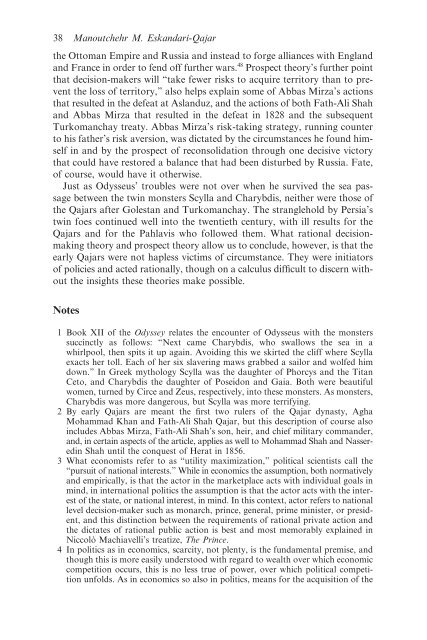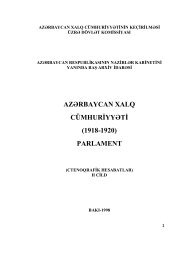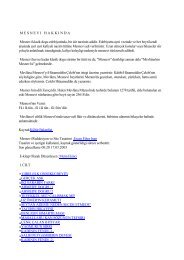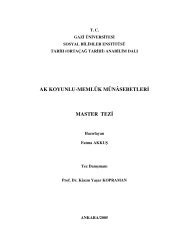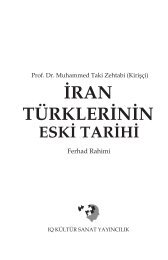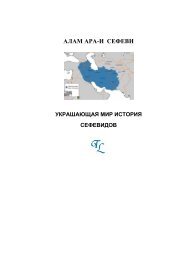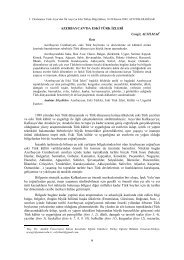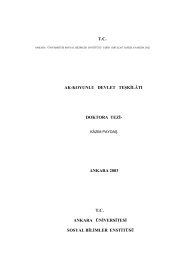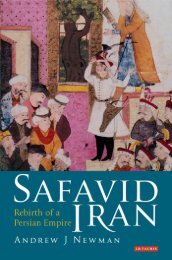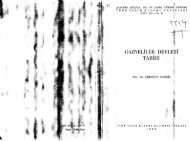Between Scylla <strong>and</strong> Charybdis 37could have had access to. Hav<strong>in</strong>g pursued her <strong>in</strong>terests on several fronts witha s<strong>in</strong>gular view of rega<strong>in</strong><strong>in</strong>g lost territories <strong>in</strong> the Caucasus, <strong>Persia</strong> could nothave acted differently given the resources available to her. Had she <strong>in</strong> facthad a stronger military with more modern equipment or the support of anally who would commit troops side-by-side with her, there is little doubt thatAbbas Mirza could have recovered some, if not all, of the lost ground. Despitethe limited means at his disposal, the record of his military victories aga<strong>in</strong>stRussia is not negligible, <strong>and</strong> if it is suggested that more could have been done,the onus surely would have to be on those who suggest it, to show how, giventhese parameters, limitations <strong>and</strong> constra<strong>in</strong>ts push<strong>in</strong>g on <strong>Persia</strong>, <strong>Persia</strong>could have done better than she did.Rational theory shows that <strong>Persia</strong>’s reaction was called forth by Russia’sactions <strong>in</strong> the Caucasus. Rational decision-mak<strong>in</strong>g theory also shows that<strong>Persia</strong>’s decision-makers had little choice as to how to react. Rationaldecision-mak<strong>in</strong>g theory helps us underst<strong>and</strong> the larger context of the actionsof Russia <strong>and</strong> <strong>Persia</strong> <strong>and</strong> those of the other players, the Ottoman Empire,France. <strong>and</strong> Great Brita<strong>in</strong>. Prospect theory, on the other h<strong>and</strong>, helpsexpla<strong>in</strong> the peculiarities <strong>and</strong> differences between Agha Mohammad Khan’s<strong>and</strong> Fath-Ali Shah’s reactions to <strong>Persia</strong>’s foes.Prospect theory’s f<strong>in</strong>d<strong>in</strong>g that players tend to want to “protect what theyhave <strong>and</strong> [take] fewer risks to acquire what they want” applies very preciselyas an explanation of differences <strong>in</strong> the decisions of Fath-Ali Shah <strong>and</strong> AghaMohammad Khan. There is no question that people <strong>in</strong> general <strong>and</strong> decisionmakers<strong>in</strong> particular, tend to be risk-takers when they start out <strong>and</strong> areseek<strong>in</strong>g to achieve their goals, but once they have reached those goals orapproximated them, they tend to become risk averse <strong>in</strong> order to ma<strong>in</strong>ta<strong>in</strong>their achieved status. Given the exigencies <strong>and</strong> pressures on Agha MohammadKhan as a dynasty builder <strong>and</strong> consolidator, he was will<strong>in</strong>g to take greatrisks <strong>and</strong> <strong>in</strong>cur heavy personal costs to rega<strong>in</strong> <strong>Persia</strong>’s territorial heritage.The loss of his beloved brother by his own h<strong>and</strong>, the constant campaign<strong>in</strong>g.<strong>and</strong> the hardship of life on the battlefield – all these were offset by the goalof unify<strong>in</strong>g rule over <strong>Persia</strong>, consolidat<strong>in</strong>g power for the sake of pass<strong>in</strong>g iton to his chosen heir, Baba Khan (Fath-Ali Shah), <strong>and</strong> establish<strong>in</strong>g a viabledynasty that could withst<strong>and</strong> the <strong>in</strong>evitable challenges <strong>and</strong> uncerta<strong>in</strong>ties thatany new rulers might face.The circumstances surround<strong>in</strong>g Fath-Ali Shah’s rule, on the other h<strong>and</strong>,were very different from those of his uncle, <strong>and</strong> thus his aims <strong>and</strong> goalswere quite different also. For Fath-Ali Shah, ma<strong>in</strong>tenance of power, notconsolidation, was important. Given the memory of the turmoil under whichthe dynasty was established, the violent deaths of his great-gr<strong>and</strong>father <strong>and</strong>namesake Fath-Ali Khan, <strong>and</strong> that of his gr<strong>and</strong>father, father <strong>and</strong> uncle, <strong>and</strong>the many years of <strong>in</strong>ternal strife, <strong>and</strong> foreign wars it took before he was ableto reach the throne of <strong>Persia</strong>, his paramount goal throughout his rule wasstability <strong>and</strong> thus risk aversion. For Fath-Ali Shah this translated <strong>in</strong>to a desireto end military engagements as soon as possible with foreign foes such as
38 Manoutchehr M. Esk<strong>and</strong>ari-<strong>Qajar</strong>the Ottoman Empire <strong>and</strong> Russia <strong>and</strong> <strong>in</strong>stead to forge alliances with Engl<strong>and</strong><strong>and</strong> France <strong>in</strong> order to fend off further wars. 48 Prospect theory’s further po<strong>in</strong>tthat decision-makers will “take fewer risks to acquire territory than to preventthe loss of territory,” also helps expla<strong>in</strong> some of Abbas Mirza’s actionsthat resulted <strong>in</strong> the defeat at Asl<strong>and</strong>uz, <strong>and</strong> the actions of both Fath-Ali Shah<strong>and</strong> Abbas Mirza that resulted <strong>in</strong> the defeat <strong>in</strong> 1828 <strong>and</strong> the subsequentTurkomanchay treaty. Abbas Mirza’s risk-tak<strong>in</strong>g strategy, runn<strong>in</strong>g counterto his father’s risk aversion, was dictated by the circumstances he found himself<strong>in</strong> <strong>and</strong> by the prospect of reconsolidation through one decisive victorythat could have restored a balance that had been disturbed by Russia. Fate,of course, would have it otherwise.Just as Odysseus’ troubles were not over when he survived the sea passagebetween the tw<strong>in</strong> monsters Scylla <strong>and</strong> Charybdis, neither were those ofthe <strong>Qajar</strong>s after Golestan <strong>and</strong> Turkomanchay. The stranglehold by <strong>Persia</strong>’stw<strong>in</strong> foes cont<strong>in</strong>ued well <strong>in</strong>to the twentieth century, with ill results for the<strong>Qajar</strong>s <strong>and</strong> for the Pahlavis who followed them. What rational decisionmak<strong>in</strong>gtheory <strong>and</strong> prospect theory allow us to conclude, however, is that theearly <strong>Qajar</strong>s were not hapless victims of circumstance. They were <strong>in</strong>itiatorsof policies <strong>and</strong> acted rationally, though on a calculus difficult to discern withoutthe <strong>in</strong>sights these theories make possible.Notes1 Book XII of the Odyssey relates the encounter of Odysseus with the monsterssucc<strong>in</strong>ctly as follows: “Next came Charybdis, who swallows the sea <strong>in</strong> awhirlpool, then spits it up aga<strong>in</strong>. Avoid<strong>in</strong>g this we skirted the cliff where Scyllaexacts her toll. Each of her six slaver<strong>in</strong>g maws grabbed a sailor <strong>and</strong> wolfed himdown.” In Greek mythology Scylla was the daughter of Phorcys <strong>and</strong> the TitanCeto, <strong>and</strong> Charybdis the daughter of Poseidon <strong>and</strong> Gaia. Both were beautifulwomen, turned by Circe <strong>and</strong> Zeus, respectively, <strong>in</strong>to these monsters. As monsters,Charybdis was more dangerous, but Scylla was more terrify<strong>in</strong>g.2 By early <strong>Qajar</strong>s are meant the first two rulers of the <strong>Qajar</strong> dynasty, AghaMohammad Khan <strong>and</strong> Fath-Ali Shah <strong>Qajar</strong>, but this description of course also<strong>in</strong>cludes Abbas Mirza, Fath-Ali Shah’s son, heir, <strong>and</strong> chief military comm<strong>and</strong>er,<strong>and</strong>, <strong>in</strong> certa<strong>in</strong> aspects of the article, applies as well to Mohammad Shah <strong>and</strong> Nassered<strong>in</strong>Shah until the conquest of Herat <strong>in</strong> 1856.3 What economists refer to as “utility maximization,” political scientists call the“pursuit of national <strong>in</strong>terests.” While <strong>in</strong> economics the assumption, both normatively<strong>and</strong> empirically, is that the actor <strong>in</strong> the marketplace acts with <strong>in</strong>dividual goals <strong>in</strong>m<strong>in</strong>d, <strong>in</strong> <strong>in</strong>ternational politics the assumption is that the actor acts with the <strong>in</strong>terestof the state, or national <strong>in</strong>terest, <strong>in</strong> m<strong>in</strong>d. In this context, actor refers to nationallevel decision-maker such as monarch, pr<strong>in</strong>ce, general, prime m<strong>in</strong>ister, or president,<strong>and</strong> this dist<strong>in</strong>ction between the requirements of rational private action <strong>and</strong>the dictates of rational public action is best <strong>and</strong> most memorably expla<strong>in</strong>ed <strong>in</strong>Niccolò Machiavelli’s treatize, The Pr<strong>in</strong>ce.4 In politics as <strong>in</strong> economics, scarcity, not plenty, is the fundamental premise, <strong>and</strong>though this is more easily understood with regard to wealth over which economiccompetition occurs, this is no less true of power, over which political competitionunfolds. As <strong>in</strong> economics so also <strong>in</strong> politics, means for the acquisition of the
- Page 2 and 3: War and Peace in Qajar PersiaPersia
- Page 4 and 5: War and Peace inQajar PersiaImplica
- Page 6 and 7: ContentsList of figuresContributors
- Page 8 and 9: Figures5.1 Omani enclaves 1305.2 Ar
- Page 10 and 11: Contributor listMansoureh Ettehadie
- Page 12: AcknowledgementsThis volume grew ou
- Page 15 and 16: 2 Roxane Farmanfarmaianrepresented
- Page 17 and 18: 4 Roxane Farmanfarmaianchapter in t
- Page 19 and 20: 6 Roxane FarmanfarmaianThus, two si
- Page 21 and 22: 8 Roxane Farmanfarmaiangaining grea
- Page 23 and 24: 10 Roxane Farmanfarmaiantough deals
- Page 25 and 26: 12 Roxane FarmanfarmaianIranian geo
- Page 27 and 28: 14 Peter W. Averyin Shiraz and cont
- Page 29 and 30: 16 Peter W. Averybut the invasion w
- Page 32: Part IWar
- Page 35 and 36: 22 Manoutchehr M. Eskandari-Qajarth
- Page 37 and 38: 24 Manoutchehr M. Eskandari-Qajarap
- Page 39 and 40: 26 Manoutchehr M. Eskandari-Qajarmi
- Page 41 and 42: 28 Manoutchehr M. Eskandari-Qajarth
- Page 43 and 44: 30 Manoutchehr M. Eskandari-Qajardo
- Page 45 and 46: 32 Manoutchehr M. Eskandari-QajarIn
- Page 47 and 48: 34 Manoutchehr M. Eskandari-Qajarco
- Page 49: 36 Manoutchehr M. Eskandari-QajarTh
- Page 53 and 54: 40 Manoutchehr M. Eskandari-Qajarth
- Page 55 and 56: 42 Manoutchehr M. Eskandari-Qajarop
- Page 57 and 58: 44 Manoutchehr M. Eskandari-Qajarbe
- Page 59 and 60: 46 Manoutchehr M. Eskandari-Qajarva
- Page 61 and 62: 48 Stephanie Cronincapacity and res
- Page 63 and 64: 50 Stephanie Croninforces of the es
- Page 65 and 66: 52 Stephanie CroninPART ONE: THE QA
- Page 67 and 68: 54 Stephanie Croninprincipally on h
- Page 69 and 70: 56 Stephanie CroninThe French offic
- Page 71 and 72: 58 Stephanie CroninEuropean alignme
- Page 73 and 74: 60 Stephanie Croninthe authorities
- Page 75 and 76: 62 Stephanie Croninin the revolutio
- Page 77 and 78: 64 Stephanie Croninof power and sta
- Page 79 and 80: 66 Stephanie Croninliving and the m
- Page 81 and 82: 68 Stephanie Croninconsequences for
- Page 83 and 84: 70 Stephanie Croninrevolution was a
- Page 85 and 86: 72 Stephanie CroninNew British miss
- Page 87 and 88: 74 Stephanie CroninBrigade to a Div
- Page 89 and 90: 76 Stephanie Croninwithout the sove
- Page 91 and 92: 78 Stephanie Croninaccounting devic
- Page 93 and 94: 80 Stephanie Croninbut also faced a
- Page 95 and 96: 82 Stephanie Cronindetermined on th
- Page 97 and 98: 84 Stephanie Cronin15 For a discuss
- Page 99 and 100: 86 Stephanie Cronin55 The Anglo-Rus
- Page 101 and 102:
3 The Turko-Persian War1821-1823Win
- Page 103 and 104:
90 Graham WilliamsonThe resultant w
- Page 105 and 106:
92 Graham Williamsonprovincial forc
- Page 107 and 108:
94 Graham WilliamsonThe field armyO
- Page 109 and 110:
96 Graham Williamsonnot hold out mu
- Page 111 and 112:
98 Graham Williamsonoften in arrear
- Page 113 and 114:
100 Graham Williamsonthan any desig
- Page 115 and 116:
102 Graham WilliamsonThere were ove
- Page 117 and 118:
104 Graham Williamsonone should not
- Page 119 and 120:
Table 3.2 Persian regional armies (
- Page 121 and 122:
108 Graham WilliamsonIranian influe
- Page 123 and 124:
4 Social networks andborder conflic
- Page 125 and 126:
112 Vanessa MartinPersian troops on
- Page 127 and 128:
114 Vanessa Martinof comparatively
- Page 129 and 130:
116 Vanessa MartinTHE ROLE OF SOCIA
- Page 131 and 132:
118 Vanessa MartinThe Shah’s negl
- Page 133 and 134:
120 Vanessa Martinborder or any oth
- Page 135 and 136:
122 Vanessa Martin44 No. 38, 2 June
- Page 138 and 139:
5 The consolidation of Iran’sfron
- Page 140 and 141:
Consolidation of Iran’s frontier
- Page 142 and 143:
Consolidation of Iran’s frontier
- Page 144 and 145:
Consolidation of Iran’s frontier
- Page 146 and 147:
Consolidation of Iran’s frontier
- Page 148 and 149:
Consolidation of Iran’s frontier
- Page 150 and 151:
Figure 5.2 Arab principalities
- Page 152 and 153:
Consolidation of Iran’s frontier
- Page 154 and 155:
Consolidation of Iran’s frontier
- Page 156 and 157:
Consolidation of Iran’s frontier
- Page 158 and 159:
Consolidation of Iran’s frontier
- Page 160 and 161:
Consolidation of Iran’s frontier
- Page 162 and 163:
6 Narrowing the frontierMid-ninetee
- Page 164 and 165:
Narrowing the frontier 151witnessed
- Page 166 and 167:
Figure 6.1 The 1843 borderlands sta
- Page 168 and 169:
Narrowing the frontier 155And the S
- Page 170 and 171:
Figure 6.2 The 1850 Williams line a
- Page 172 and 173:
Narrowing the frontier 159elicited
- Page 174 and 175:
Narrowing the frontier 161travellin
- Page 176 and 177:
Narrowing the frontier 163be found
- Page 178 and 179:
Narrowing the frontier 165A similar
- Page 180 and 181:
Narrowing the frontier 167and accep
- Page 182 and 183:
Narrowing the frontier 169Perhaps t
- Page 184 and 185:
Narrowing the frontier 171By this s
- Page 186 and 187:
Narrowing the frontier 17346 For a
- Page 188 and 189:
Crime, security, and insecurity 175
- Page 190 and 191:
Crime, security, and insecurity 177
- Page 192 and 193:
Crime, security, and insecurity 179
- Page 194 and 195:
Crime, security, and insecurity 181
- Page 196 and 197:
8 Merchants without bordersTrade, t
- Page 198 and 199:
Merchants without frontier 185the m
- Page 200 and 201:
Merchants without frontier 187and d
- Page 202 and 203:
Merchants without frontier 189photo
- Page 204 and 205:
Merchants without frontier 191their
- Page 206 and 207:
Merchants without frontier 193In an
- Page 208 and 209:
Figure 8.1Seated, first from left:
- Page 210 and 211:
Figure 8.3Seated: Hajj Mohammad-Taq
- Page 212 and 213:
Figure 8.5 Taken in Hajj Hasan Jour
- Page 214 and 215:
Merchants without frontier 201Figur
- Page 216 and 217:
Merchants without frontier 203Studi
- Page 218 and 219:
Merchants without frontier 20516 Me
- Page 220 and 221:
Merchants without frontier 207and t
- Page 222 and 223:
Merchants without frontier 209or pu
- Page 224 and 225:
Merchants without frontier 211It ca
- Page 226 and 227:
9 The politics of concessionReasses
- Page 228 and 229:
The politics of concession 215gradu
- Page 230 and 231:
The politics of concession 217Shah,
- Page 232 and 233:
The politics of concession 219assig
- Page 234 and 235:
The politics of concession 221compa
- Page 236 and 237:
The politics of concession 223gross
- Page 238 and 239:
The politics of concession 225the B
- Page 240 and 241:
The politics of concession 227as th
- Page 242 and 243:
IndexAbbas Mirza, Crown Prince 6, 1
- Page 244 and 245:
Index 231Gulf Arabs 127-9Gwadar 136
- Page 246 and 247:
Index 233policy in Persian Gulf 131


